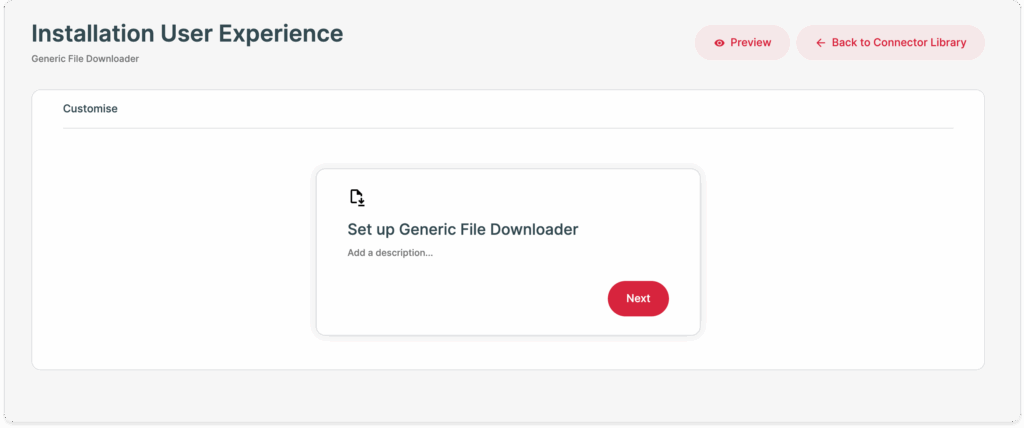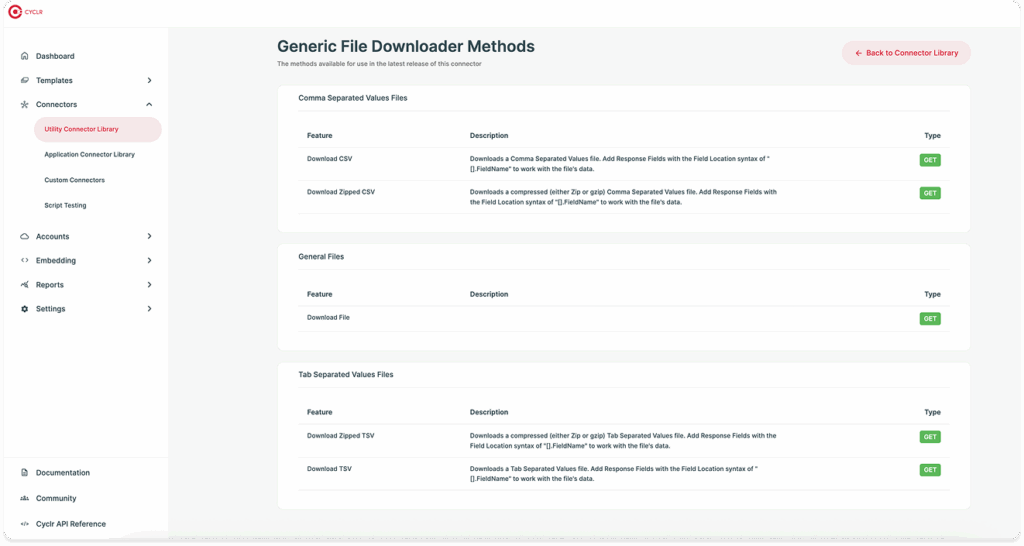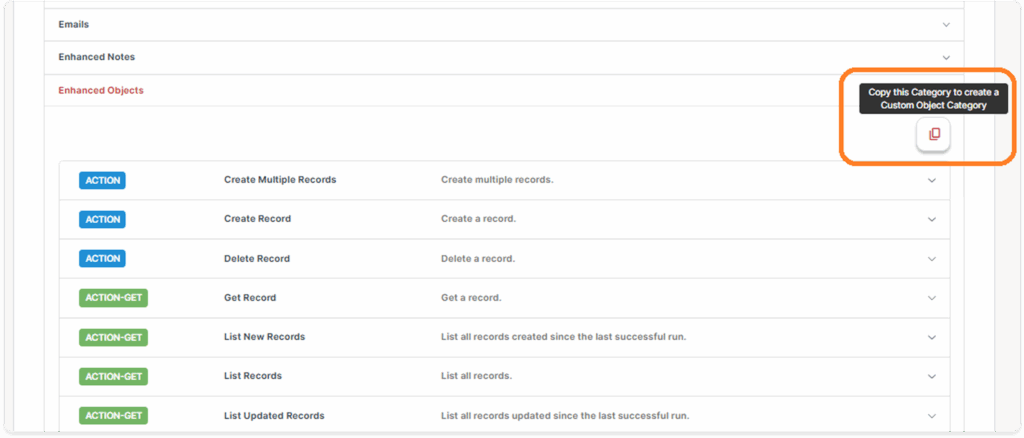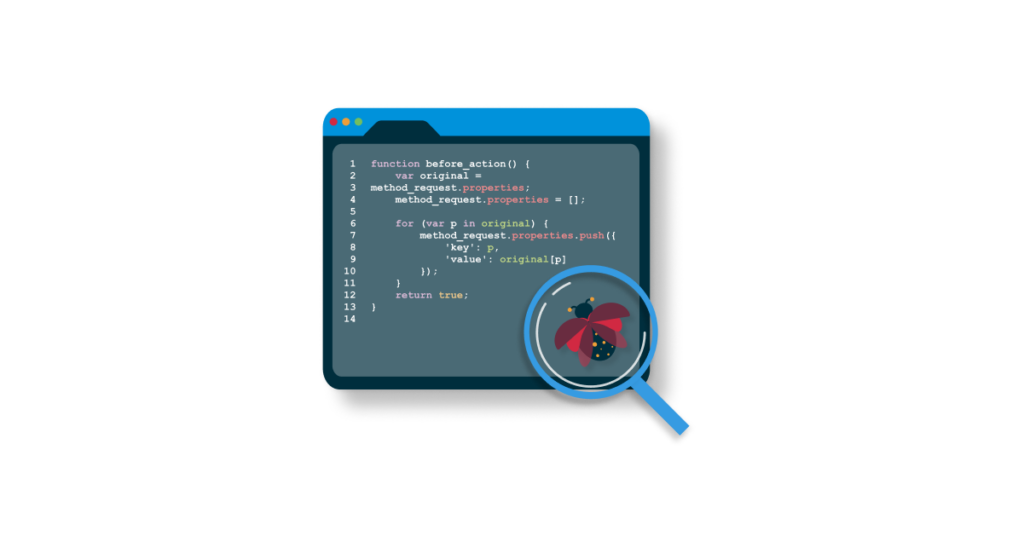
Updated on by Susanna Fagerholm
Managing data in integrations often means handling numerous file formats and sources, especially when working across multiple systems. The newest addition to Cyclr’s Utility Connectors, the Generic File Downloader, is specifically designed to simplify these common integration challenges.
The Generic File Downloader allows direct download of files into integration workflows. This means faster, simpler, and more efficient integration setups, particularly valuable when handling diverse client needs or frequently updating datasets.
Join us for a scheduled demo
See Cyclr and the Utility Connector Generic File Downloader in action at one of our regularly scheduled demos.
What is the Generic File Downloader?
The Generic File Downloader is an advanced Utility Connector within Cyclr that enables direct download of files into integration workflows without manual intervention. It makes the process of accessing and managing data files from diverse sources easier than ever, accommodating different generic file formats, including CSV, TSV, and compressed files (Zip or gzip).
The Connector can be beneficial for processing datasets efficiently, especially when these datasets come in compressed formats such as Zip or gzip files. The ability to download these files directly into an integration makes data transfer much faster. However, we recommend users to reference our payload size limitations before trying to work with larger files.

Key Benefits of the Generic File Downloader
- Versatile File Handling:
- Download CSV and TSV files to work with their data directly in integration cycles and templates.
- Support for compressed files (Zip or gzip), optimizing bandwidth usage, and speeding up transfers.
- Clear and Flexible Data Extraction Structure:
- Define which values to extract from each row using the “[].FieldName” syntax. Replace FieldName with the actual column name, such as “[].ProductID” or “[].Price”, to specify what data Cyclr should use.
- Wide Compatibility:
- Generic “Download File” option for handling other file formats, enhancing flexibility across diverse scenarios.

How does the Generic File Downloader work?
Just like any other Utility Connector, the Generic File Downloader requires no authentication. It only needs a URL to a file when used inside integration workflows.
The Connector itself has five methods, under three method categories:
- Comma Separated Values Files
- Download CSV: Downloads a Comma Separated Values file.
- Download Zipped CSV: Downloads a compressed (either Zip or gzip) Comma Separated Values file.
- Tab Separated Values Files
- Download TSV: Downloads a Tab Separated Values file.
- Download Zipped TSV: Downloads a compressed (either Zip or gzip) Tab Separated Values file.
- General Files
- Download File: Used to download file types not handled by the other methods.
Before these methods can be used in an integration workflow, the columns of the files the connector needs to work with must be defined as Response Fields for each method. This lets Cyclr know what kind of data it should expect. The process is similar to adding custom fields to any other connector’s methods.
The recommended usage of the Generic File Downloader is to create Custom Object Categories to work with specific files. However, the initial methods can also be modified directly for convenience.
Once the Response Fields are set up, the methods can be dragged and dropped into integrations as steps. Using the Connector inside a template or cycle only requires the URL from which files will be downloaded. The URL could be publicly accessible, or the system hosting it may require an API key within the URL as a way to secure access.
Using Custom Object Categories
Each method category of the Generic File Downloader supports Custom Object Categories. This means that any of its method categories can be copied to create a new custom category that can be configured to work with a specific data object.

This allows users to set up a custom object for specific files that they are often dealing with by creating a named category with specific response fields that relate to that particular file’s structure.
For example, if a team regularly receives files with the same structure, creating a custom object for that file makes it possible to automate any repetitive tasks relating to it. Just copy the method category and configure the response fields specific to that file structure.
These copyable object categories can be set up once a Generic File Downloader has been installed:
- Navigate to the Connector and select either the Settings button or the pencil icon to Edit it.
- Next, choose one of the method categories to work with. Open it to find and click the “Copy Custom Object Category” button. Name the new Object Category with a descriptive name, this could for example be the name of the file for which it will be set up.
- The new object will appear in the methods and fields area of the Connector. Open each of its methods to configure the response fields.
- Add response fields by either inputting them manually from the Add Field button or generating several fields in bulk through the Generate Fields button.
- Use the “[].FieldName” syntax to reference specific fields in each row of a structured file (e.g., CSV or TSV). Replacing “FieldName” with the actual column name from the file.
- Click Save.
Once saved, the custom object and its methods will be available in the Builder, ready to be used in workflows without reconfiguring each time.
Read more about how to set up Custom Object Method Categories in our documentation.
Want a demo with one of Cyclr’s integration experts?
Book a demo with one of our team to see Cyclr and the Utility Connector Generic File Downloader in action. Start your integration journey today!
Practical Use Cases
One of the primary use cases for the Generic File Downloader is regularly required downloads of files. These could be anything from product inventories and pricing data to event attendees and legacy system exports – any data that’s available through a URL that requires migration from a file into a SaaS application.
For example, imagine a marketing team that hosts webinars or events and receives attendee lists as downloadable CSV files from the event platform.
With the Generic File Downloader, they can set up a workflow that:
- Retrieves the latest attendee file from a public or authenticated URL
- Extracts attendee details (e.g., [].FirstName, [].Email)
- Adds or updates contact records in the CRM, such as Salesforce or HubSpot.
This would ensure timely follow-ups, reduce manual effort, and keep the CRM up to date with accurate event data.
Conclusion
The Generic File Downloader solves a common challenge: how to reliably bring external file data into SaaS systems without creating more work for the team.
Whether receiving text data files from partners, reports from third-party tools, or export files from legacy systems, this new connector provides a flexible way to automate the retrieval and handling of that data inside integration workflows.
It doesn’t require extra infrastructure or custom scripts, just a URL to a file, a known structure, and a place to send the data. With support for common formats like CSV, TSV, and compressed files, it fits into a wide range of practical scenarios.
Instead of manually importing files or writing code to bridge systems, consider using the Generic File Downloader for a cleaner, more scalable solution.



